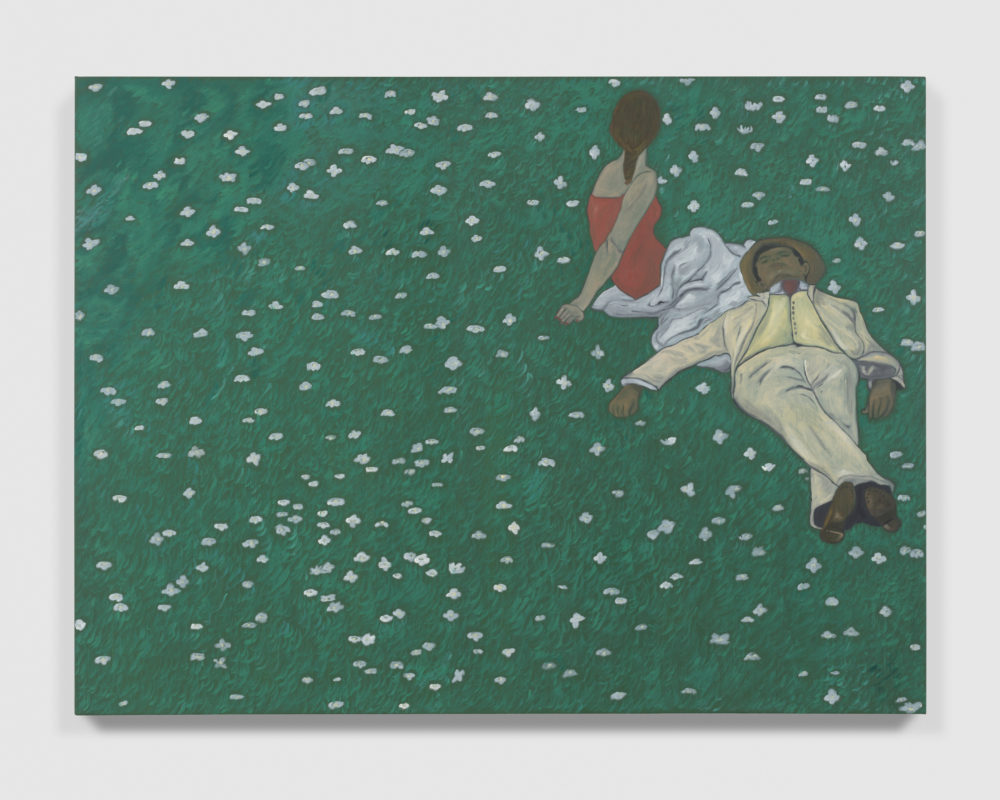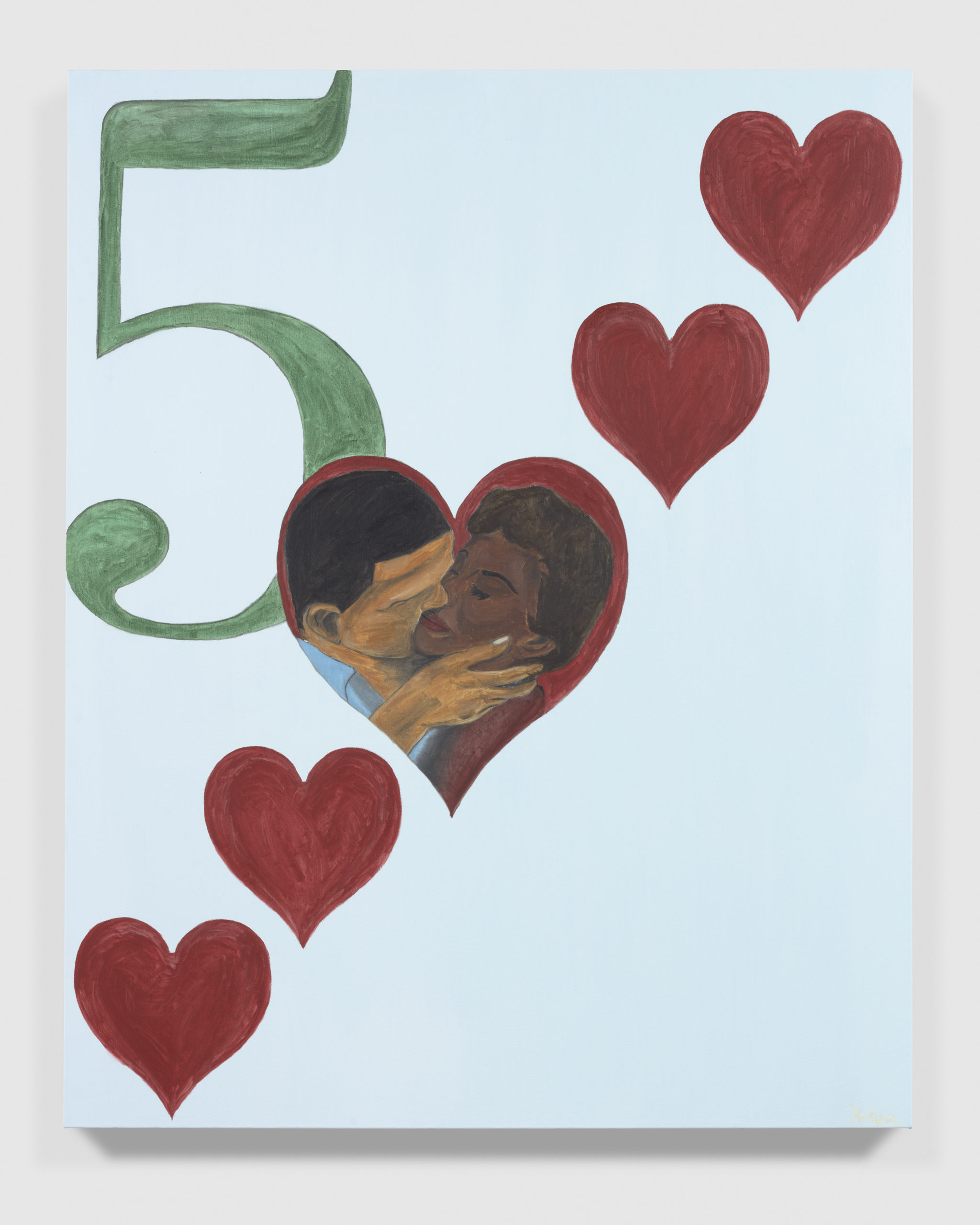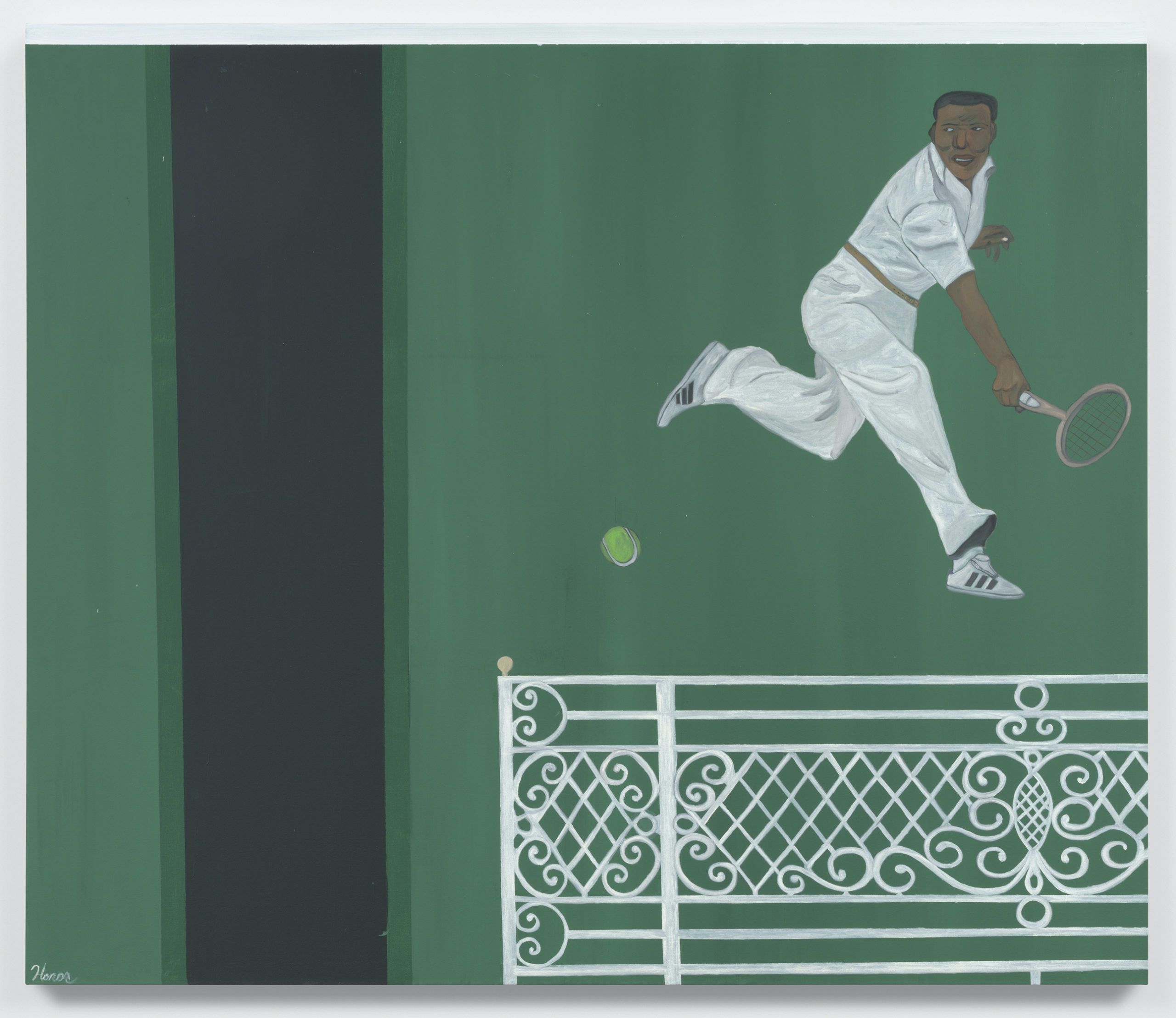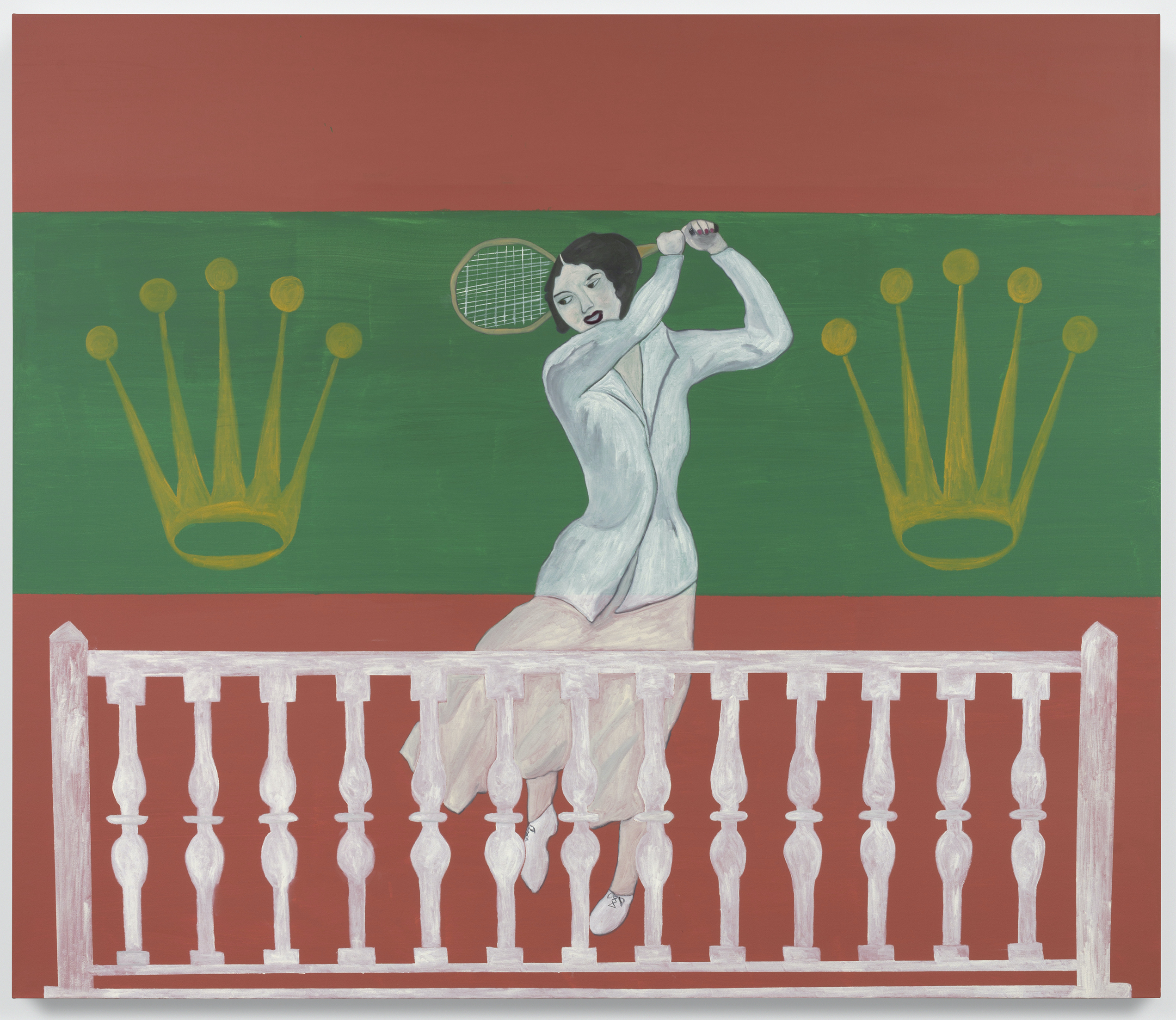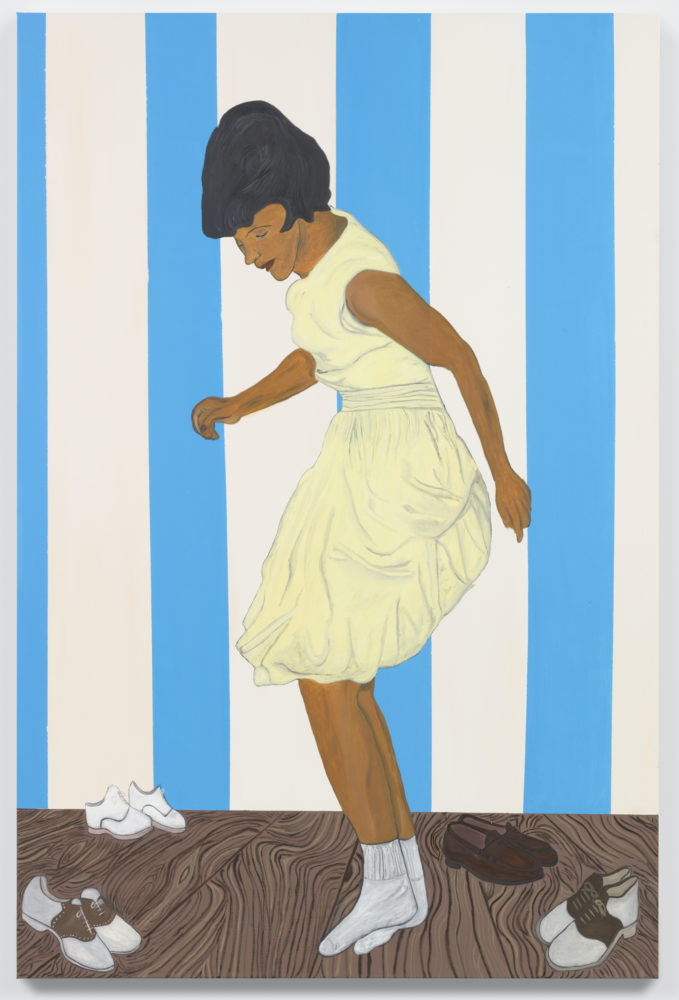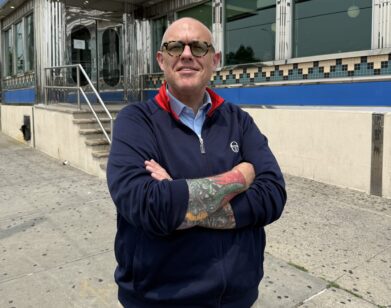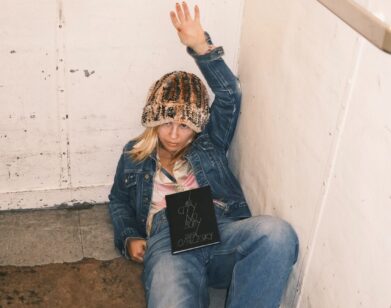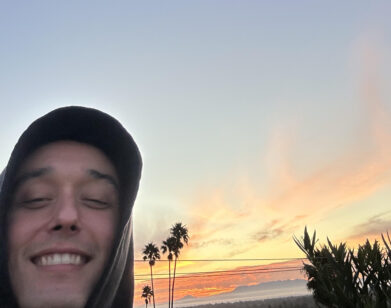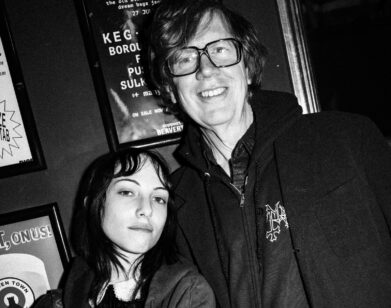in conversation
Honor Titus and Henry Taylor Get Down to the Real Nitty-Gritty
One art form is not enough for the musician-turned-painter Honor Titus. Best known as the frontman of the Brooklyn punk-rock band Cerebral Ballzy, Titus would have been well within his right to remain swimming in the deep end of the New York music scene (Titus’s father, Andre “Dres” Titus, was a member of the hip-hop duo Black Sheep). But over the past decade, Titus has proved himself an aesthetic journeyman, acting in films, modeling, and writing poetry. But it is visual art where he has proven himself a cogent and moving practitioner. Having worked under artists @jsuch as Raymond Pettibon (who also did Cerebral Ballzy’s self-titled 2011 album cover), Dan Colen, and Ryan McGinley, Titus has struck out on his own with a series of romantic, figurative paintings that conjure nostalgic, art-historical vignettes (the leisure of lawns, car culture, dances), but casts them through a gripping surrealistic lens that feels startlingly fresh. When Titus moved to Los Angeles in 2016, he became friends with Henry Taylor, a living legend of figurative painting. Taylor has proved something of a mentor, guide, and reliable confidante to the budding painter, especially during the past year of lockdowns. As Titus prepares for his first solo show in New York at the end of January at Timothy Taylor Gallery, he and Taylor got together at Taylor’s studio—and talked on the phone in separate rooms—to discuss inspiration, finding your own voice, and why it’s never too late to start loving what you do.
———
HONOR TITUS: Okay, we’re on and talking.
HENRY TAYLOR: I don’t want to go to jail. I ain’t telling them too much. Hey. Oh my gosh. Oh shit, boy.
TITUS: We’ve got to act like we’re on a jail phone, Hen.
TAYLOR: Yeah, so how many years you got?
TITUS: I’m facing the rest of my life. [Laughs] You know, talking on the phone together like this is a very Warholian situation. What do you think of Warhol?
TAYLOR: Oh man, he just did it. I think of him almost as punk rock, you know what I’m saying? He informs me in so many ways. I started fucking with boxes and shit, when he was doing Brillo and all that. I also did this show called “Alimento,” which means “nourishment” in Spanish. Some people have Campbell chicken soup in their cabinet. I look in my cabinet and I got welfare peanut butter and welfare cheese. We used to stand in line for that food. So, yeah, it’s funny how certain artists can permeate your work. You start to incorporate things that they’ve done or they might inspire you to try something, and you’re able to spin off of that, you know? Sort of like a reinterpretation, like Jimi [Hendrix] doing “Star Spangled Banner.” I mean, we done heard that song a lot, but Jimi fucked that shit up, you know what I mean? He said, “We can do it this way.” It’s good that people are free to do what the fuck they want, man, you know? My mama said, “What’s that bicycle doing? What’s that stool doing in that bucket? Take this shit out.” “But no mama, this is art. This is my bullshit.”
TITUS: I find inspiration in Warhol in the same way as you do, in the sense of just opening different frames of thought and hitting from left field. I also love the idea of something just looking good, which is oftentimes, in Warhol’s case, enough. Just to provide something beautiful is enough; to provide something appealing is enough.
TAYLOR: Yeah, remember when holes in your pants wasn’t cool? You know what I’m saying? Sometimes you’ve got to almost mature into art, or have more honest eyes. I always think, “Hey, if Picasso in his later years was at Disneyland drawing portraits, motherfuckers would throw shit at him and say, ‘Uh-ah, you’d better give me my money back. I don’t look like that.’” We’ve just got to let people be individuals.
TITUS: I agree wholeheartedly.
TAYLOR: Don’t just listen to one kind of music. If you eat beans and rice every day, you want to taste something else. It’s like my cats: I was giving them dry food, and one day I gave them wet food and they went nuts.
TITUS: We started hanging out a load about three years ago and it’s been such a gift. You’ve been so inspirational in so many ways. I’ve always admired your work ethic. I’m lucky enough to hang out with you during Covid. How has it been for you? I know you’ve been working, but have you been finding inspiration?
TAYLOR: I always find inspiration. I’m middle-aged, so you start to think a little more seriously about things, but you don’t want to be too serious because that might fuck up your flow. You ain’t in court. Your studio is not the courtroom. It don’t take much for me to want to pick up a brush, and I bet it didn’t take much for Jimi to pick up a guitar. Some people are just forever inspired. They can’t not do it, you know?
TITUS: The more respected artists I’ve known find their work a place of solace, a place where they can be away from the turmoil of the world. And I feel like I have that myself, where I go to the studio to just be with my own thoughts. This is such a time for introspection. What have you been working on during this time?
TAYLOR: I’ve been making sculptures the last few weeks and I never really focused on that. But then there was talk of an upcoming show at Hauser & Wirth Somerset (opening on February 26th) so I started working toward that. I agree when you say the work is a place of solace. The work is just a part of me. It’s in my DNA. That’s my addiction. I might wake up looking for a brush.
TITUS: It’s always sad to me when someone doesn’t have a passion. It’s like when you’re driving around in a car with someone and you’re like, “Hey, you want to play a song?” And they’re like, “I don’t care.” Or you ask, “What kind of music do you like?” And they’re like, “I don’t know.” It always surprises me that people aren’t adamant, that people don’t have their own ideas and their own visions.
- Down the Line,” 2020.
- “Roland Garros,” 2020.
TAYLOR: It’s like when there’s no sports on TV and someone’s like, “What the fuck am I going to do? Goddamn.” Well, you’ve got to find yourself another love.
TITUS: Enthusiasm is a divine trait.
TAYLOR: I’m looking at my paintings and, goddamn, this is the good life. I get paid for doing what I love.
TITUS: Painting for me is kind of journalistic. I would reference something that I’d been thinking about a lot or I would paint a girl that I was thinking about or something like that. I did a few tennis paintings because I’ve been playing a ton of tennis. Inspiration has ebbed and flowed these months, but it’s good to have this upcoming show in January.
TAYLOR: I don’t think you should kick yourself for being all over the place, because I would say you’ve got to be loved before you can be solid. Sometimes you just go out there. And sometimes we can overthink and sometimes we’ve just got to get in there and try new things. Maybe you haven’t tried collage or sculpture. It’s good to be all over the place. Sounds too much like being a ho, huh? Look, I’m promiscuous. I’m all over the place. It’s like brainstorming. There’s a lot of things I cut out and don’t use, and there’s materials everywhere. The other day I was sourcing materials for a sculpture and I was looking at piles of trash. That’s probably why my neck hurts. I was turning left and right. Instead of looking at women, I was looking at trash. That became my focus.
TITUS: I love that about you. Okay, Coltrane or Miles? What would you put on first thing in the morning if you had to choose?
TAYLOR: I’d probably start with Coltrane.
TITUS: There was a story I love where Miles was in Spain and he was talking to some troubadour bull man and told him, “Hey man I’m working on this album of Bolero music, of Spanish indigenous bull music,” and this guy laughed at him. And then Miles gave him the tape and then he went away and listened to it and he came back crying.
TAYLOR: Sometimes that’s why he who judges first judges last. And sometimes you hear something the first time and you just don’t get it. It’s just like a lot of art. I was introduced to a lot of artists by my seventh-grade teacher, and some of them I was feeling and some of them I wasn’t. And then later on I thought, “Mm-hmm, I get it.” Like, when I was a kid I didn’t like sushi, you know what I’m saying? I love it now. Sometimes you just ain’t ready.
TITUS: And sometimes the art meets you where you’re at.
TAYLOR: There’s a lot out there to soak up, especially for an artist. But it’s like what we were saying before, you can be a great guitar player. But maybe all you can play is “Stairway to Heaven.” You can’t play anything of your own.
TITUS: It’s the journey for declaration. Trying to figure out, “What is the piece saying? What are you trying to do?” And, believe me, I’ve met a lot of music-school kids who can tell you how many augmented fifths and how the bridge should crescendo, but they couldn’t write a good song.
TAYLOR: And it’s soulless, man. But you know how it is. You’ve worked with artists. You worked with Raymond Pettibon for a year, and just being around these kinds of people gives you confidence. It has to be in your DNA, but goddamn, why are you so good so young?
TITUS: Henry, I’ve always appreciated the way that we get down. You’ve always made sure that we had room for conversation and hanging out, and that’s always been so appreciated.
TAYLOR: My junior college teacher, the one who told me to go to college, had been in a show with Rauschenberg. I only found out like 20 years later that had this amazing peer group. He was so sure of himself and he was never bitter. I revered this man and he changed my life. And when I went and saw him at 91, I told myself, “Man, I should have been visiting him at least once a month.” Sometimes you’ve got to just crack it open and say, “Hey man, we need to have this.” Go to the real and talk. And sometimes it’s hard. I’m the youngest of eight kids. I have five brothers. My father used to call us “bullets.” And I’m like, “Why in the fuck does he call us bullets?” Because his daddy was shot when he was 9, and so he says, “Meet my bullets.” When I’ve thought about a film or a storyboard, I’ve had to think about his past. You’ve got to think about the characters in your paintings, and these characters have lives. You can’t develop it like a film, but still there’s a narrative there. So sometimes we just have to go deeper.
TITUS: There’s so much life in your work. And I think that’s an objective, that’s a goal, that’s a hope, just to capture that life into a tangible object, whether it be sculpture or painting. I try to do that. I often think, “What’s the objective?” For me, it’s to capture this life, to leave something behind. It’s almost a poem on canvas; it’s a tangible, visual poem. It’s something that just encapsulates life. And your paintings, they’re just so exuberant, and there’s so much life in them all.
TAYLOR: When I walked in your studio, I was impressed. I love the work you’re making. It’s all the way up. I know you’ve already had a couple of shows at galleries in New York. You’ve been lucky to have a father who is an artist. That helped to develop the person you are. I grew up and most of my peers didn’t know I made paintings. That wasn’t something I would talk about. Instead of taking art classes, I was playing football or baseball or basketball. And finally I thought, “Fuck all that. I ain’t never going to be a baseball player.” My mama said, “Always put your best foot forward,” and it wasn’t sports, so I tried to find something else and fortunately I had people in my life, like my seventh-grade teacher, who showed me paintings. I’m grateful for that.
TITUS: I’m grateful for you, and I love you.
TAYLOR: You’re my man. I’ve got one of your paintings right in my dining room and, man, everybody always asks who did it. Yeah, I’m glad to be a part of your life and be your friend. And we can’t take none of this for granted, and we should always try to have conversations with our friends and try to get down to the real nitty-gritty.

